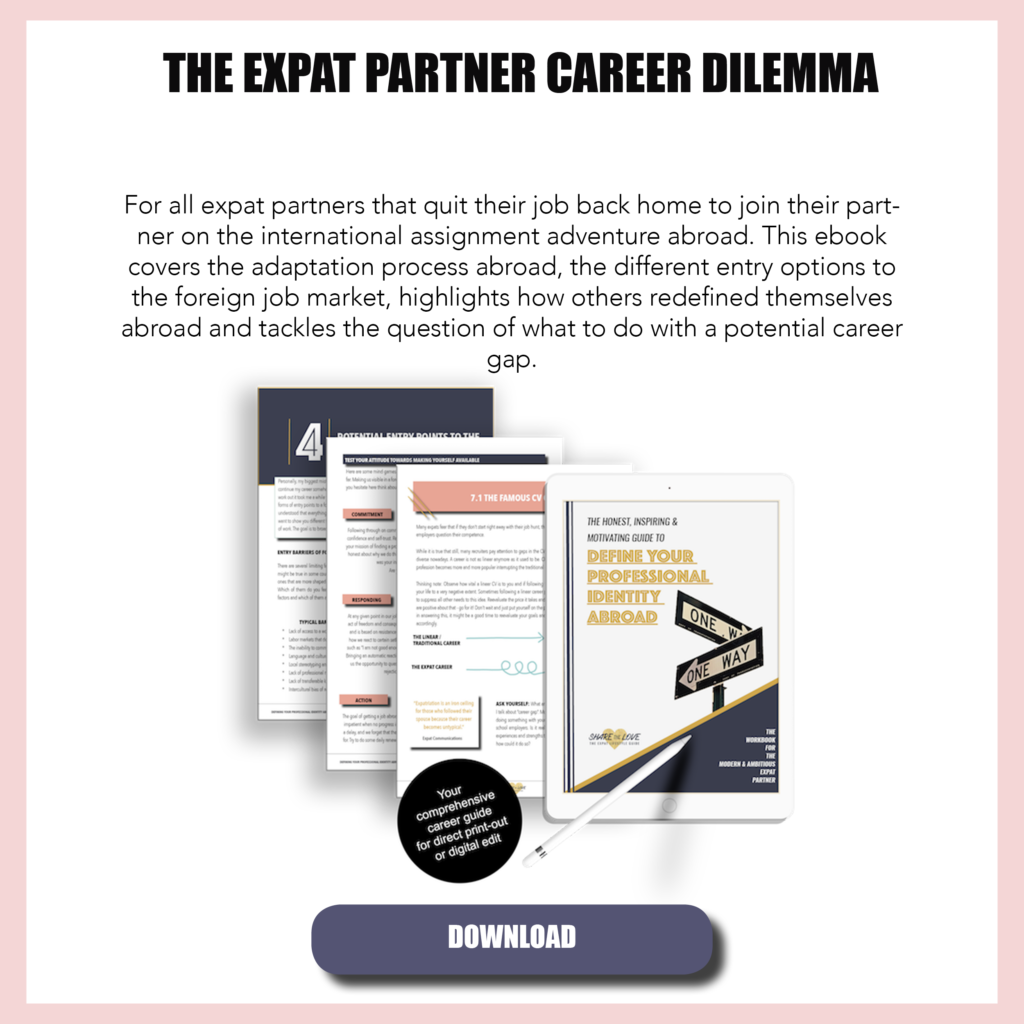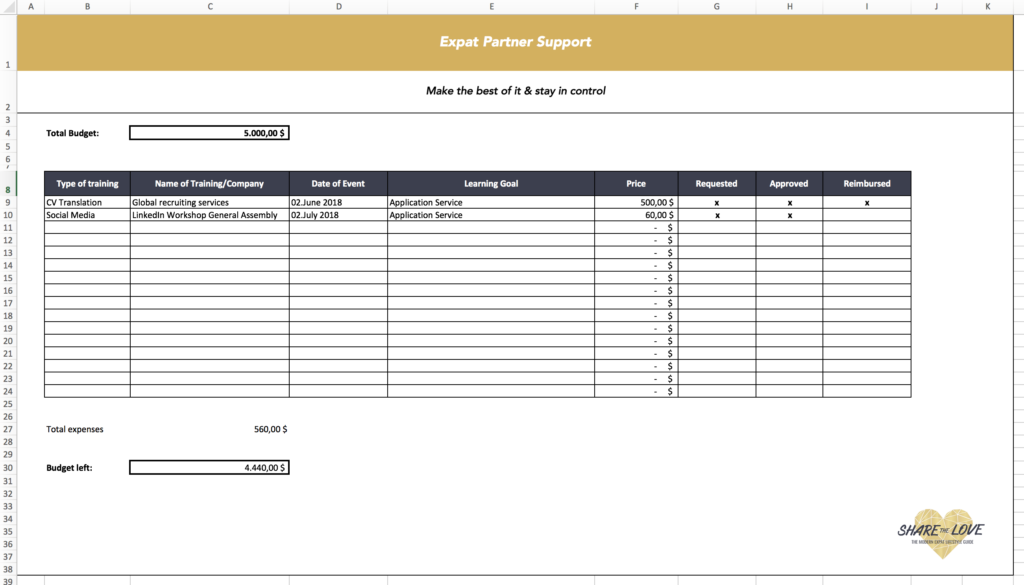
MANAGE YOUR EXPAT PACKAGE EXPENSES
If you are an employee sent abroad by the company you want to read this, I will give an overview of the essential aspects of expat benefits and how to negotiate a better deal.
What is an expat benefit package?
There are many words to describe the benefits expats receive when being transferred abroad by a company: Expat Package, Expat Benefits, Deployment Package are just a few to name. No matter the label, let us dive into what it is you need to know BEFORE and DURING your time abroad. There are hardly any official studies of how big those expat packages are because each company is managing this topic differently. Benefits are highly individual and at the end it is also a matter of negotiation.
The size of the expat package depends on:
The company factor
- Industry
- Company Size
- Company Culture
The human factor
- Management Level
- Family Status
- Children
- Negotiation Skills
Typical parts of an Expat Package
As stated, expat packages are highly individual. There are however benefits that are more common than others. I most recently asked 25 families for their personal benefits. About 70% of them received some sort of Expat Package. International Health Care, Housing Allowance, and flights back home have been the most mentioned items on the list.
While 25 families are not a high number to compare, the answers actually reflected what I am hearing from many others throughout the last year and are hence a good indication to start with.
How expat Packages will change in the future
Not only the world is getting more global but also our minds! Back in the days, companies tried to convince their top employees to accept an international assignment by offering anything to make life abroad as comfortable as possible. Next to financial incentives, many used to have their private driver and other support in the form of employees. Next, to making life more comfortable, this is also connected to the responsibility of supporting the local economy (which is still in practice today). Depending on the country not that much has changed. However, if countries are not that exotic, there are often many employees lining up waiting for their chance to go abroad. So there is less obligation to make this journey attractive. Therefore many experts argue that expat packages are decreasing in value and number of benefits over time.

However, at the same time, we see a second trend: The rise of dual-career couples. Nowadays more and more young professionals are shying away from taking on an international assignment if the partner can’t find work. Most accompanying partner will stop working during the time abroad. As an effect, household income is decreasing despite the financial benefits of the expat package (depending on the deal).
As a consequence, more and more employees are demanding expat partner support in the form of work permit management, language courses, and career coaching. Intercultural training and educations packages are becoming more popular. Smaller companies are not aware of the need to the same extent but are slowly realizing that coaching is not that expensive for the company to pay but has a very positive effect on the attitude of the partner towards the expatriation adventure.
Don't miss out on new posts and free templates
How to negotiate the expat package
There are a couple of tips I can mention from experience that many expats would have loved to consider upfront. Of course, each situation and company policy is different but I am a huge believer in: Nothing will get better if we won’t communicate our needs! So here it is, my top tricks:
- Negotiate upfront: When expatriation is on the table know your value and the benefit you will bring. Negotiating upfront will always be more accessible than doing it from abroad.
- Research: HR departments act on the feedback of previous experiences but have most likely not moved abroad with their whole family before. Therefore, it is always wise to form your own opinion by talking to former expats, search in expat forums and speak to expats online that are living in the respective country right now.
- Include your partner: Think about how your employer can support your partner. Think about work permit, coachings, language courses, etc. Remember that those costs are mostly only a fraction of the budget but will have a significant impact on the wellbeing of the partner.
- Make your family visible: Let the HR partner know about your family situation. Maybe let your partner communicate directly with the HR representative. Mostly this has a positive effect on getting training fees accepted.
- Make life easier: if you want your company to pay for a specific thing always think about the reasoning behind and let them know. Write short information about why that benefit is important, what the costs would be, the timeframe, etc. This way it will be easier for the HR representative to authorize the training.
WHAT IF THERE IS NO EXPAT PACKAGE?
Some words to the Expat Partner: Don’t be discouraged if you don’t get enough financial support from your partner’s employer. These support packages are not a guarantee for success. What you mostly need lies within you already: drive, persistence, and patience. You need to define a strategy for yourself on how you want to approach your career during your time abroad – with or without an Expat Package.
However, only because their is no defined process within the company for expat benefits it never is too late to ask!
TRACK YOUR BUDGET EXPENSES
If you find yourself in the lucky position to have access to an Expat Education Package I only can recommend you to use it wisely. At the very beginning, I set up an Excel sheet to follow up on all my expenses and to keep track on the budget left to decide on whether to add another training for myself or not.
Here is a picture of that Excel sheet. If you want to track your budget in a similar way you can download this sheet with a simple click for free. Customize it to your own needs and likes.
I hope this information is helpful to you and will encourage you to ask for some benefits! Let’s connect via Social Media or send me a message to info@sharethelove.blog if you want to chat about it.
Happy Budgeting!
Thanks for sharing the love and stopping by

Send this article to a friend & share the love:
You also might like:

Quick Steps to Re-enter the workforce
Re-entering the job market after a longer career break can be a daunting task. Many people who take time off from their careers for various reasons such as raising a family, caring for a loved one, or pursuing further education can find it difficult to re-enter the workforce. This is because the job market is constantly evolving, and the skills and experience that were once valuable may no longer be relevant. However, there are ways to succeed in re-entering the job market and I am sharing them here in this blog post and in my free guide book.

Support services for accompanying partners abroad
The well-being of the accompanying partner on traditional corporate assignments is not only in the interest of the partner and the family but also in the interest of the company sending the family abroad. Countless studies show that a struggling accompanying partner is causing a higher ratio of earlier returns or unsuccessful postings. In this blog post, I am covering the different aspects of company support. You will learn what kinds of support aspects you might be able to receive and motivates you to take your own adjustment abroad seriously.

Changing values in the job market 2023
The beginning of the year is always a time for reflection and it is therefore not surprising that many people also consider whether their current job or employer still suits them. In today’s blog post, I summarize a few interesting facts from a Europe-wide HR study on changing core values of employees. This will give you a good feeling of where you stand compared to others – even when you are thinking about re-entering the job market, these facts are very helpful to get a feeling for the new value construct of the job market 2023.

The secret ingredient that turns a profession into a vocation
In psychology, many scholars have already addressed the question of what the difference is between a profession and a vocation and why people who are lucky enough to have found their vocation are so much more fulfilled in their lives. In this blog post, I’ll give you insight into the fundamental distinction between a profession and a vocation, and let you in on the secret ingredient discovered through research that turns a profession into a vocation.

Turning a hobby into a profession: A check in 2-years later
In this blog post, our first role model Leonie looks back on her professional path over the last two years and allows us to have a peek into her personal journey to turn a hobby into a profession. She shares her learnings as well her passion projects for 2023. As many of you loved this portrait I am so happy to be able to present a follow up to you!

How repatriation triggers an identity shift affecting your career plans
What happens to my own self-perception when we pack our bags as a family and move back to our Passport Country? For many women, especially those who had paused their career, this moment is often the impulse to re-enter the labor market as a matter of course. For many, the question arises: what does the move mean for myself? For my career plans and personal future? In this blog post, I provide insights into what changes from a psychological perspective and what the return to work means.








2 Antworten
Relocating to a new home can be stressful, but choosing the right moving company can make all the difference. Whether you’re moving across town or across the country, professional movers can help ensure a smooth transition. Discover the best residential movers in Downtown Denver for reliable and affordable moving services.
When moving abroad, having the right expat package can make a world of difference, helping you transition smoothly. But no matter how well-prepared you are, having professional movers by your side is key to a stress-free relocation. For reliable moving services, check out the professional home movers in Downtown Denver.